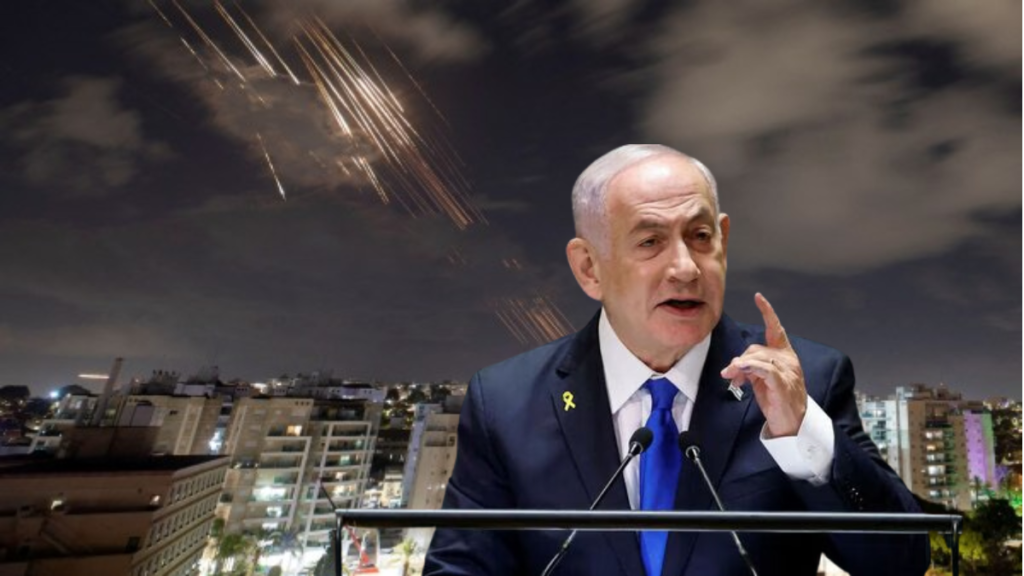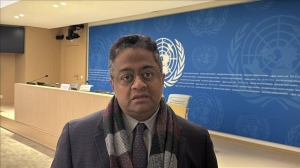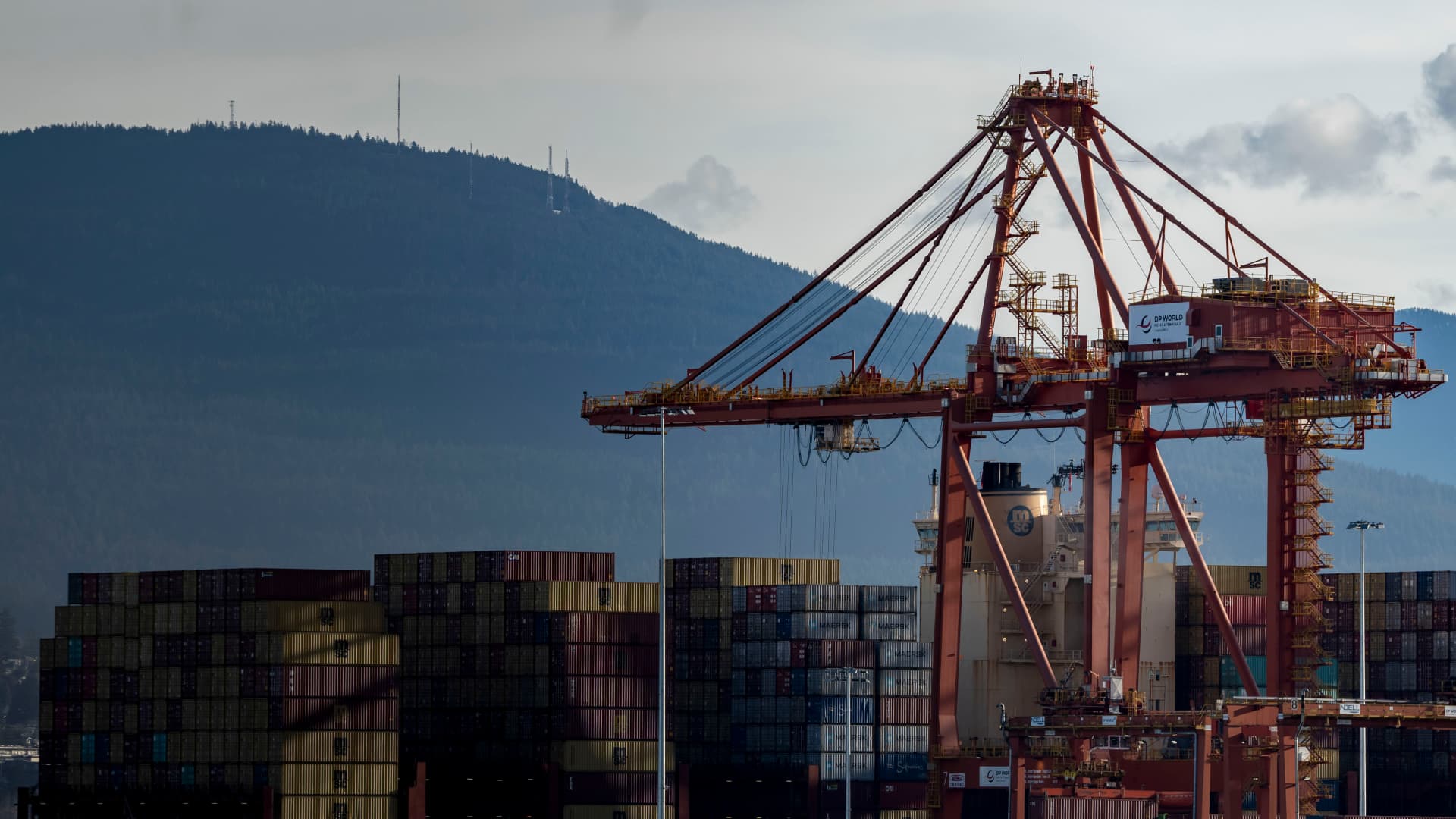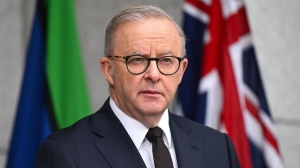Iran vs Israel: Another dramatic escalation of hostilities in the Middle East, Israeli Prime Minister Benjamin Netanyahu delivered a strong message to Iran after a significant missile attack. “Iran made a huge mistake tonight, and it will pay a price for it,” Netanyahu declared as tensions escalated following an Iranian missile attack on Israel on October 1, 2024. The attack was so brutal that it caused widespread destruction and civilian casualties, which has sparked international concern. Concerns were raised at the East Asia Summit, and the United States warned about the possibility of a wider regional conflict.
Table of Contents: Iran vs Israel
Iran missile attack: Retaliation in the air
Iran’s Islamic Revolutionary Guard Corps fired more than 200 ballistic missiles towards several Israeli cities, including Tel Aviv, the Israeli Defense Forces have confirmed the attack. The military said 181 missiles struck Israel, although the Iron Dome intercepted many. Although the system proved effective, the rockets fell on some strategic points and panic spread. Air raid sirens sounded across Israel and civilians were told to take shelter. The shockwaves of explosions reverberated across central Israel, Ashkelon and Tel Aviv.
The Israeli military responded immediately with retaliatory airstrikes on Iranian targets in Syria and Lebanon. The attacks, which reportedly killed 22 people in Beirut and injured 117 others, are part of a larger campaign to destroy Hezbollah targets. Hezbollah, long recognized as a central figure in the ongoing hostilities between Israel and its regional adversaries, is a Lebanese militant group backed by Iran.
Casualties and Damage within Israel
The missile attack on Israel was heavy. Local officials revealed that a house in the Al-Saftawi neighbourhood was hit by a missile, killing one person and injuring several others. The Central Israel School and Restaurant in Tel Aviv were also not spared. The images of the dead may still haunt Israelis as fears began to spread from every corner of the country that some civilians would certainly be killed. The psychology was shocked to see such an attack and people fled to take shelter for fear of further attacks.
The Iron Dome system, which intercepted a large number of incoming missiles, once again proved to be very important for Israel’s self-defence against air threats. Even though the success rate of this system was so high, some missiles managed to evade it; so the threat posed by Iran’s ballistic missile capability is even more dynamic.
Netanyahu: Warning words to Iran
Soon after the attack, Israeli Prime Minister Netanyahu warned Iran, saying, “Whoever attacks us, we will attack them. They will have to bear the consequences of their act.” According to Netanyahu, this Iranian attack was a “failure”, and was no different from previous Israeli operations against Hamas and Hezbollah. Netanyahu also said, “We will not end our campaign before we neutralize the threats posed by these groups.”
Netanyahu’s speech reflected Israel’s growing frustration with Iran in the region. Over the years, Iran has been found arming and financing terrorist groups such as Hamas and Hezbollah; hence, the region has become even more unstable. The attack on Israel appears to be Iran’s retaliatory move against the targeted killings of prominent figures in Hezbollah and Hamas leadership, such as Hassan Nasrallah, Ismail Haniyeh, and Revolutionary Guards deputy commander Abbas Nilforoushan.
Iran’s stance: In its defence
However, Iran described the missile attack as a retaliatory strike for the aggressive nature of Israeli forces. Iran’s President Masoud Pezeshkian claimed that the missile attack was in defence of Iran’s national interest and Israel’s recent actions. In a statement after the attack, Pezeshkian said, “Netanyahu should know that Iran does not want war, but we will stand firm against any threat.” He said that Israel’s continued military attacks on targets in the region, especially in Syria and Lebanon, have prompted Iran to take serious action.
Iran’s remarks coincide with the deep-rooted animosity between the two countries as it has established itself as a regional power to protect its allies. Iran’s ties with Hezbollah and, more generally, its support for Palestinian movements such as Hamas were elements of its foreign policy that often put it at odds with Israel.
Regional repercussions and US involvement
The global community has taken note of the missile attack and the retaliatory Israeli response. They fear it could escalate into a wider regional war. The United States, also an ally of the nation, has sounded the alarm bell at the East Asia Summit where a high-ranking official warned of violence in the Middle East, the scale of which is increasing steadily and rapidly. The US is monitoring the situation very closely and is urging both sides to exercise restraint.
In a speech at the summit, a senior US official expressed fears that the conflict would swallow the entire region in a vortex, especially now that other regional players such as Lebanon and Syria have also joined the fight. “The situation in the Middle East is extremely volatile, and we urge all parties to reduce tensions to avoid further bloodshed,” the official told the media.
Israeli attacks in Lebanon and the Gaza Strip
After the Iranian missiles attacked, Israel retaliated by carrying out a series of airstrikes on Hezbollah’s military bases in Lebanon. Reportedly, the Israeli army bombed several places in the city of Beirut. 22 people were killed and 117 others were injured in the attack. According to reports, the airstrikes were aimed at Hezbollah chief Wafik Safa, although he had reportedly left before the attack. The airstrikes hit the headquarters of UN peacekeepers in Naqoura, injuring two UN staff.
Lebanese officials strongly condemned the attacks carried out by Israel and called for an immediate halt to the attack. Lebanon’s UN ambassador formally requested a halt to the killing during an emergency meeting of the UN Security Council. Israeli officials said their military operations would continue until Hezbollah’s “terror” operations were ended. Israel’s invasion of Lebanon by ground troops began on October 1. The invasion has been opposed by UN peacekeepers stationed along the border. The situation is further complicated by the fact that there is an emerging problem of tension between Israeli forces and the UN peacekeeping mission along with the already existing crisis.
Israeli airstrikes in Gaza target militant groups
Heavy casualties and killings: Palestinian officials have claimed more victims in the airstrikes carried out by Israel. Yesterday, Israeli airstrikes killed at least 27 people, including women and children, while they were sheltering other displaced civilians in a school in the Gaza Strip. The attack sparked a reaction among Palestinians and the international community demanded an investigation.
Global reactions: Calls for a ceasefire
The conflict between Israel and Iran will escalate and will soon draw international condemnation. Its major players have called for an immediate end to hostilities. Throughout this conflict, the United Nations has been prominent in calls for peace mediation, urging restraint against both parties, particularly Israel and Iran.
The United States expressed support for Israel’s right to self-defence but urged Israel to avoid actions that would further inflame the situation. Privately, US officials have expressed a concern in the region: that an aggressive military operation by Israel could push the region into a wider war, involving not only Lebanon but also Syria and Iraq.
This is the East Asia Summit where the entire issue in the Middle East is discussed, and indeed, it is a very important discussion as global leaders warn of violence and encourage diplomatic actions that will bring peace to end the emerging crisis. And, naturally, there has not been such a turn of events that either Israel or Iran will give up, so no one can predict what the path to peace will be.
Conclusion
The last missile attack by Iran and Israel’s quick response has pushed the Middle East almost towards full-blown war. With groups like Hezbollah in the fray, the conflict could very well spread to the rest of the region. And now, with the Israeli military still promising more attacks and Iran calling them “meaningless,” the world will be anxiously looking for ways to resolve this tangle.
The US warning at the East Asia Summit reflects the urgency of the situation, as all the superpowers are watching anxiously, hoping to avert a war that could unleash infection and devastation of catastrophic proportions.

THE PLANET POLITICS
Disclaimer
The content on this platform, including articles and images, is sourced from various reputable news websites, publications, and publicly available information across the internet. We do not create these stories or images independently, nor do we claim ownership of the original material. All content is provided for educational and informational purposes only, aiming to offer a broader understanding of global events. We are not responsible for the accuracy, reliability, or validity of the information or images presented. Any reliance on this content is at the user’s discretion.




